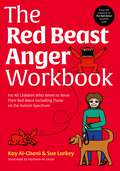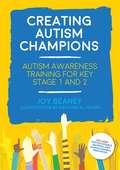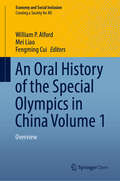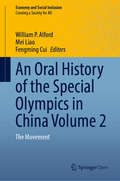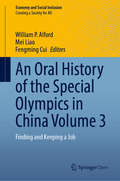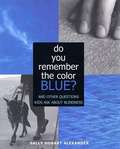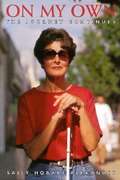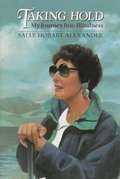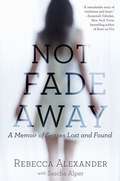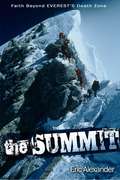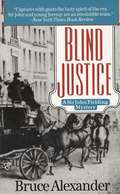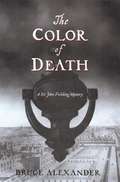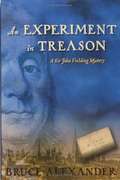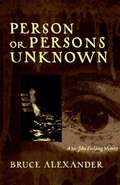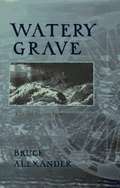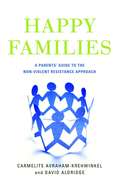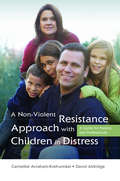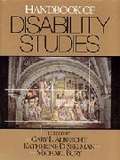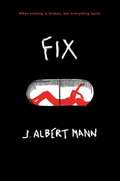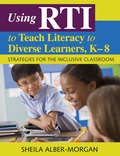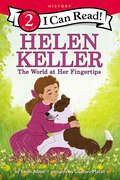- Table View
- List View
Every Teacher's Little Book of Wisdom
by Bob Algozzine Kate AlgozzineThis wee book is full of inspiring ideas, and good pointers on how to be the best teacher you can be. Written by two noted Special Educators these pointers apply to any teacher from Nursery school to a Ph.D. adviser. Worth the look if you are or want to be a teacher. "People with disabilities are just like everybody else. They have dreams, goals, and aspirations just like their neighbors and peers. When they are children, they deserve the same educational experiences as their neighbors and peers: Good teachers who hold high expectations for success; good teachers who know how to manage classrooms to maximize learning opportunities for all students; and, good teachers who teach them to read, to do mathematics, or to do anything else they need or want to learn. Nothing about having a disability limits an individual's desire to learn. Nothing about having a disability should limit the willingness of a teacher to teach. Good teaching is good teaching and there are no boundaries on where it can occur and who will profit from it. We believe this and try to make it happen whenever we teach. Now it is up to you."
The Red Beast Anger Workbook: For All Children Who Want to Tame Their Red Beast Including Those on the Autism Spectrum
by Kay Al-Ghani Sue LarkeyThis illustrated and interactive workbook will help children find ways to calm their Red Beast and learn how to prevent it from waking in the first place. Full of practical activities and illustrated examples, it supports the development of emotional and sensory regulation and provides coping mechanisms for children who experience intense emotional flooding or meltdowns as well.The workbook includes a helpful introduction for adults on the science of self-regulation, clear guidance on how to pace the learning and a wide range of activities such as scenarios to help children explore their anger, anger management plans, and exercises that encourage interoceptive awareness. It also addresses common causes of anger including perfectionism, winning and losing and discusses the importance of a positive attitude and using kind words in a child-friendly way.Join Danni and his friends and family as they explore the challenges they face from the Red Beast and how they overcome them.
Creating Autism Champions: Autism Awareness Training for Key Stage 1 and 2
by Haitham Al-Ghani Joy BeaneyRaising awareness and understanding of autism has school-wide benefits, such as helping to improve the attitudes of pupils and staff and allowing children with autism to thrive socially, emotionally and educationally alongside their peers. This comprehensive resource provides a whole school programme for raising autism awareness and promoting inclusion. It includes training for staff in the knowledge and skills they need to support pupils, a sample school assembly, and lesson plans for teaching groups of pupils to be 'autism champions'. This programme also offers photocopiable worksheets and online presentations to use as part of the staff training, school assembly and peer awareness lessons. There is advice for involving children with autism and their parents in school activities. Easily adaptable for different age groups, this is a ready-made resource for schools committed to promoting autism awareness and whole school welfare.
An Oral History of the Special Olympics in China Volume 1: Overview (Economy and Social Inclusion)
by William P. Alford Mei Liao Fengming CuiThis open access book is unique in presenting the first oral history of individuals with an intellectual disability and their families in China. In this summary volume and the two accompanying volumes that follow, individuals with an intellectual disability tell their life stories, while their family members, teachers, classmates, and co-workers describe their professional, academic, and family relationships. Besides interview transcripts, each volume provides observations and records in real time the daily experiences of people with an intellectual disability. Drawing on the methodologies of sociology and oral history, the summary volume provides an unprecedented account of how people with intellectual disabilities in China understand themselves while also examining pertinent issues of public policy and civil society that have ramifications beyond the field of disability itself.
An Oral History of the Special Olympics in China Volume 2: The Movement (Economy and Social Inclusion)
by William P. Alford Mei Liao Fengming CuiThis open access book contains the oral histories that were inspired by the work of the Special Olympics in conjunction with the 50th anniversary of its founding. The foreword and prefatory materials provide an overview of the Special Olympics and its growth in the People’s Republic of China. The sections that follow record interview transcripts of individuals with intellectual disabilities living in Shanghai. In addition to chronicling the involvement of these individuals and their families in the Special Olympics movement, the interview transcripts also capture their daily lives and how they have navigated school and work.
An Oral History of the Special Olympics in China Volume 3: Finding and Keeping a Job (Economy and Social Inclusion)
by William P. Alford Mei Liao Fengming CuiThis open access book brings together oral histories that record the experiences of individuals with intellectual disabilities in Shanghai as they participate in their careers. Employees with intellectual disabilities describe their experiences seeking, attaining, and maintaining employment. Their managers, colleagues, and family members also provide keen insight into the challenges and opportunities these individuals have encountered in the process of securing employment. An appendix provides a compilation of employment policies related to people with intellectual disabilities, particularly with respect to Shanghai.
Do You Remember the Color Blue?: And Other Questions Kids Ask about Blindness
by Sally Hobart AlexanderChildren ask questions of an author who lost her vision at the age of twenty-six, including "How did you become blind?" "How can you read?" and "Was it hard to be a parent when you couldn't see your kids?"
Mom Can't See Me
by Sally Hobart AlexanderNine-year-old Leslie tells how her mom does everyday tasks while being blind, from keeping track of her daughter at nursery school to going to soccer games, to the movies, and canoeing.
On My Own: The Journey Continues
by Sally Hobart AlexanderThe second part of the author's autobiography, of which the first part, Taking Hold, was published in 1994. The author describes the difficulties and accomplishments she experiences as she adjusts to living independently after losing her sight.
Taking Hold: My Journey into Blindness
by Sally Hobart AlexanderA true story of the author's loss of vision as a young woman and of her adaptation to blindness.
Not Fade Away
by Rebecca Alexander Sascha Alper<P>Even a darkening world can be brilliantly lit from within. <P>Born with a rare genetic mutation called Usher Syndrome type III, Rebecca Alexander has been simultaneously losing both her sight and hearing since she was a child, and was told that she would likely be completely blind and deaf by age 30. Then, at 18, a fall from a window left her athletic body completely shattered. <P>None of us know what we would do in the face of such devastation. What Rebecca did was rise to every challenge she faced. She was losing her vision and hearing and her body was broken, but she refused to lose her drive, her zest for life and - maybe most importantly - her sense of humor. Now, at 35, with only a sliver of sight and significantly deteriorated hearing, she is a psychotherapist with two masters' degrees from Columbia University, and an athlete who teaches spin classes and regularly competes in extreme endurance races. She greets every day as if it were a gift, with boundless energy, innate curiosity, and a strength of spirit that have led her to places we can't imagine. <P>In Not Fade Away, Rebecca tells her extraordinary story, by turns harrowing, funny and inspiring. She meditates on what she's lost--from the sound of a whisper to seeing a sky full of stars, and what she's found in return--an exquisite sense of intimacy with those she is closest to, a love of silence, a profound gratitude for everything she still has, and a joy in simple pleasures that most of us forget to notice. <P>Not Fade Away is both a memoir of the senses and a unique look at the obstacles we all face--physical, psychological, and philosophical--exploring the extraordinary powers of memory, love, and perseverance. It is a gripping story, an offering of hope and motivation, and an exquisite reminder to live each day to its fullest.
The Summit
by Eric AlexanderIt's one of the greatest challenges one can face on Earth: an ascent to the top of the world on the slopes of Mount Everest. Eric Alexander experienced grace and a faith-empowering journey he will never forget as part of a record-setting team in May 2001, scaling the heights of Everest with his friend, blind climber Erik Weihenmayer. Experience some of the most dangerous locations in the world, including abject terror on Ama Dablam, a blind ski descent of Russia's Mount Elbrus, and up Kilimanjaro in Africa with four blind teens Gain wisdom in the application of trust, courage, innovation, teamwork, leadership, and integrity to overcome your own Everests. Discover practical faith lessons learned on the highest peaks of six continents. Here is the powerful story of Eric Alexander and his unique life journey of guiding people with disabilities as they overcome the most perilous places of the world. Follow in their footsteps, and learn about faith, trust, prayer, depending on God, as well as the perseverance needed in your own life. Be inspired and motivated by Eric's insight, not simply to survive but to thrive every day in God's grace.
Back To Front And Upside Down
by Claire AlexanderIt's the principal's birthday, and the class is busy writing cards for the special occasion. But Stan's letters tumble out in a muddle.<P> With a friend's help, Stan finds the courage to voice his fears. And after lots and lots of practice, Stan's letters come out the right way round and the right way up.<P> This warm, sympathetic book deals with a common childhood frustration and will remind readers that everyone has to ask for help sometimes.<P> Winner of the Schneider Family Book Award
Blind Justice (Sir John Fielding Mystery #1)
by Bruce AlexanderFalsely charged of theft in 1768 London, thirteen-year-old orphaned printer's apprentice Jeremy Proctor finds his only hope in the legendary blind magistrate, Sir John Fielding. Fielding, founder of the Bow Street Runners police force, then recruits young Jeremy in his mission to fight London's most wicked crimes.
The Color of Death (Sir John Fielding Mystery #7)
by Bruce AlexanderSuspicion and fear are running high in London, as a gang of expert criminals terrorizes the town in a spree of robbery and murder--noblewomen are held at gunpoint in their parlors, and an innocent manservant is executed in cold blood. There is but one peculiar clue to the identity of this group: The robbers are all black men. When Sir John takes a bullet to the shoulder early on, it is young Jeremy Proctor--who has been the blind magistrate's eyes for so many years--who must lead this most delicate investigation, albeit under Sir John's bedridden counsel. And when Jeremy begins to turn over stones, he and Sir John come to find that black and white is never as simple as it seems--and the deeds being committed are even darker than they imagined.
An Experiment in Treason (Sir John Fielding Mystery #9)
by Bruce AlexanderA packet of incendiary letters is stolen from the London residence of a prominent official, and turns up in the colony of Massachusetts. Why are the contents of the letters so controversial? Why has a suspect in the theft turned up dead? And what should magistrate Sir John Fielding do about his feeling that Benjamin Franklin is somehow complicit? While the tensions rise, Sir John and his protégé, Jeremy Proctor, search for answers—and find that justice isn’t always served by the letter of the law.
Person or Persons Unknown (Sir John Fielding Mystery #4)
by Bruce AlexanderLegendary nineteenth-century London judge Sir John Fielding returns in the fourth--and most thrilling--of Bruce Alexander's highly praised mysteries. From the first book, the mystery lovers verdict has been unanimous: the Fielding hooks are "enthralling" (The New York Times Book Review), "first-rate" (The Boston Globe), "wonderful, beautifully written and altogether fun: (The Washington Post). John Fielding was famous not only as cofounder of London's first police force, the Bow Street Runners, but also as a magistrate of keen intellect, fairness and uncommon detective ability. When a crime was committed, he often took it upon himself to solve it. What made this all the more remarkable was that he was blind. Now the blind magistrate and his young assistant and ward, Jeremy Proctor, face a series of crimes that hit shockingly close to home. Prostitutes are being murdered around Covent Garden, and there are troubling implications about the identity of the killer. Baffled and frustrated, Fielding devises a daring and desperate plan, but the consequences are unexpected and more terrible even than he could imagine. Filled with the authentic sights and sounds and atmosphere of the times, and with a supremely colorful and varied cast of characters, Person or Persons Unknown is in every way a worthy addition to a marvelous series. BRUCE ALEXANDER is the pseudonym for a well-known author of fiction and nonfiction. The previous books in the series are Blind Justice, Murder in Grub Street (named by The New York Times Book Review as one of the Notable Books of 1995 in crime fiction) and Watery Grave. Alexander is at work on the fifth Sir John Fielding novel.
Watery Grave (Sir John Fielding Mystery #3)
by Bruce AlexanderBlind Justice, the first novel featuring legendary eighteenth-century London judge Sir John Fielding, was one of the most highly acclaimed mystery debuts of 1994. Murder in Grub Street, the second novel, was named by The New York Times Book Review as one of the Notable Books of 1995 in crime fiction. Now Fielding returns in his most baffling case yet. John Fielding was famous not only as cofounder of London's first police force, the Bow Street Runners, but also as a magistrate of keen intellect, fairness and uncommon detective ability. When a crime was committed, he often took it upon himself to solve it. What made this all the more remarkable was that he was blind. In Watery Grave, accompanied by his eyes (and the series' narrator), young Jeremy Proctor, Fielding encounters a case that hits close to home, as a stepson returns from the high seas with tales of typhoons and a captain overboard. Was it an accident, or was it murder? Fielding is asked to investigate, but discovers considerably more than he'd bargained for--including some secrets that might better have been left at the bottom of a watery grave. Filled with the authentic sights and sounds and atmosphere of the times, and with a supremely colorful and varied cast of characters, Watery Grave is in every way a delight to read.
Happy Families
by David Aldridge Carmelite Avraham-KrehwinkelParenting a severely disruptive child can be exhausting and demoralizing to the point where breaking the cycle of bad behaviour seems an impossible task. Happy Families offers a realistic, step-by-step, practical approach to tackling destructive behaviour that helps parents regain control and establish harmony within the family. Using hands-on techniques based on the principles of non-violent resistance, each chapter deals with a different stage of the process - from communicating to the child an unwavering determination that the situation will change and enlisting the support of family and friends, to taking positive action in a way that avoids escalation. General advice such as how to respond constructively and consistently to provocation is included throughout, and morale-boosting tips encourage flagging parents to persevere with the approach. Happy Families will empower despairing parents and caregivers who seek to contain, counter and positively re-direct the aggression they face from children in distress, resulting in deep-felt and lasting change.
A Non-Violent Resistance Approach with Children in Distress
by David Aldridge Carmelite Avraham-KrehwinkelParents, teachers and other professionals often struggle to know how to deal with disruptive, abusive or aggressive behaviour. This book addresses the urgent need for a realistic, practical and effective approach to dealing with severe disruptive behaviour in children and adolescents. Adapting the principles of non-violent resistance originally advocated by Mahatma Gandhi, the book provides de-escalation techniques which empower the adult and unburden the distressed child. The authors outline the theoretical basis upon which the approach was developed, and explain how and why it can be so effective. Case studies demonstrate how the approach can be used to reach more successful places with unhappy and disruptive children of different ages. A separate section for parents provides useful advice on how to take the theoretical material and use it to deal with problematic behaviour in everyday life. As effective as it is original, this approach will empower desperate parents and despairing caregivers by equipping them with hands-on tools to contain, counter and positively direct the aggression and opposition which they face from children in distress.
Handbook of Disability Studies
by Gary L. Albrecht Katherine D. Seelman Michael BuryDrawing on the insights of disability scholars around the world and the creative advice of an international editorial board, this book engages the reader in the critical issues and debates framing disability studies and places them in an historical and cultural context. Five years in the making, this one volume summarizes the ongoing discourse ranging across continents and traditional academic disciplines.
Fix
by J. Albert MannIn this gritty, heart-wrenching mystery, prose and verse mix to explores themes of disability, pain, belonging, loss, addiction, and friendship.Everything was fine before. When Eve and Lidia could hide their physical differences inside goofy Burger Hut costumes. When Lidia shook Eve up and Eve made Lidia laugh. When Lidia was there. Everything is different now. Cut open . . . rearranged . . . stapled shut, Eve is left alone to recover in a world of pain and a body she no longer recognizes. Her only companions being a bottle of Roxanol and an infuriating (but cute) neighbor, Eve strikes up a relationship—and makes a pact—with the devil. Sacrificing pieces of a place she doesn't know to return to a place she does. What will she discover when she unravels her past? And is having Lidia back worth the price? In verse and prose, Fix paints a riveting picture of a teen struggling to find herself and move forward with her life in a sea of opioids, regret, grief, and hope.
But I'm Ready to Go
by Louise Albert"Ms. Albert has written a superb book for those trying to understand what rife is like for the minimally handicapped as well as a poignant story for those who too often feel isolated or that they are coping alone. It is a book that is long overdue!' Also: "There's more to Judy's character than straight diagnosis, and her swings between brave resolution and impotent frustration are highly empathic. That one can feel as much in common with Judy's isolation in school and longing to play the guitar as with [her sister] Emily's abilities in the same areas is a measure of [Ms.] Albert's low-keyed success."
Using RTI to Teach Literacy to Diverse Learners, K-8: Strategies for the Inclusive Classroom
by Sheila Alber-MorganPractical intervention strategies for diverse learners who struggle with literacy! Covering reading and writing, this book shows K–8 teachers how to build the literacy skills of diverse learners in inclusive classrooms. The author discusses instruction and assessment within a Response to Intervention (RTI) framework and how to provide targeted support to students who may require special attention. The book offers: Specific literacy intervention strategies for each tier in a 3-tier RTI framework Examples of assessments and graphic organizers Brief case studies illustrating how the strategies can be used with students A discussion on using thematic units to integrate reading and writing
Helen Keller: The World at Her Fingertips (I Can Read Level 2)
by Sarah AlbeeLearn about the inspiring life of Helen Keller in this early reader biography.When Helen Keller was a baby, she became sick and lost her ability to see and hear. Although many people doubted her ability to persevere, Helen did not let any obstacle stop her from achieving many things in her amazing life.This book covers some of the well-known and inspiring milestones of Keller’s life—it’s a great supplement for book reports on this iconic historical figure. It also covers some of the lesser-known fun facts—did you know that Helen Keller was a long-time dog lover?This biography reader includes a timeline, historical photographs, and information about Braille. Helen Keller: The World at her Fingertips is a Level Two I Can Read, geared for kids who read on their own but still need a little help. Whether shared at home or in a classroom, the engaging stories, longer sentences, and language play of Level Two books are proven to help kids take their next steps toward reading success.

